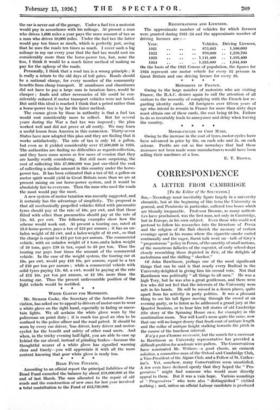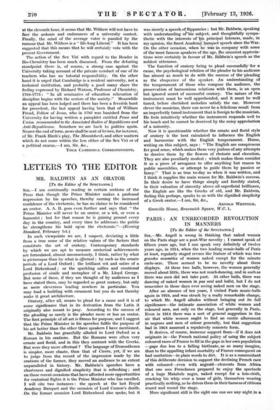CORRESPONDENCE
A LETTER FROM CAMBRIDGE
[To the Editor of the SPECTATOR.] SIR,—Necrology must inevitably figure largely in a university chronicle, but at the beginning of this term the University in general, and Pembroke in particular, suffered two losses which are literally irreparable. Professor Browne, as many authori- ties have proclaimed, was the first man, not only in Cambridge, but in Europe, in his own subject. Even those who could not pretend to follow his researches into the literature of Persia and the religion of the Bab cherish the memory of certain evenings spent in his rooms where the cigarette-smoke curled continually and the eager, fluent talk went on--talk of Grey's " preposterous " policy in Persia, of the sanctity of small nations, of the monstrous fallacies of the cugenist, of early school-days closely resembling those depicted in Eric, of the delights of melodrama and the shilling " shocker."
Of John Rawlinson, perhaps one of the most significant things that can be said is that nearly every Radical in the University delighted in giving him his second vote. Not that Rawlinson was politically 'all things to all men." He was a high Tory, but he was also a great gentleman, and there were few who did not feel that the interests of the University were safe in his hands. He will be missed in a dozen places, quite apart from his activity in party politics. It was a pleasant thing to see his tall figure moving through the crowd at an evening party, or to listen as he addressed a grand jury at the Quarter Sessions, or to hear him tell stories of old Cambridge (the story of the Spinning House case, for example) in Me combination room. Nor will Lord's seem quite the same, now that one will no longer descry that frock-coat of antique length and the collar of antique height stalking towards the pitch in the course of the luncheon interval.
Ii n'y a pas d'homnze neceszaire, but the search for a successor to Rawlinson as University representative has provided a difficult problem for academic wire-pullers. The Conservatives have nominated Mr. Withers—a good classic, an eminent solicitor, a committee-man of the Oxford and Cambridge Club, a Vice-President of the Alpine Club, and a Fellow Of St. Cather- ine's. Yet, somehow, many Conservatives seem unsatisfied. A few even have declared openly that they hoped the " Pro- gressives " might find someone who would more directly appeal to them. But it was a vain hope. Various soundings of " Progressives " who were also " diitinguished " yielded nothing ; and, unless an official Labour candidate is produced at the eleventh hour, it seems that Mr. Withers will not have to face the ardours and endurances of a university contest. Finally, the mind of the average voter is puzzled by the rumour that Mr. Withers is a" life-long Liberal." It has been suggested that this means that he will certainly vote with the present Government.
The action of the Sex Viri with regard to the Reader in Bio-Chemistry has been much discussed. From the debating standpoint there is, of course, a strong case against the University taking account of the private conduct of one of its teachers who has no tutorial responsibility. On the other hand it is urged that Cambridge is a resident university, not a technical institution, and probably a good many share the feeling expressed by Richard Watson, Professor of Chemistry, 1764-1773: "In all seminaries of education relaxation of discipline begins with the seniors of the society." Meanwhile an appeal has been lodged and there has been a feverish hunt for precedent, the last appeal having been that of William Freud, Fellow of Jesus, who in 1793 was banished from the University for having written a pamphlet entitled Peace and Union recommended to the Associated Bodies of Republicans and Anti-Republicans. Somehow we are back to politics again. Nearer the end of term, news shall be sent of leviora, for instance, of Mr. Frank Birch's play, The Mountebank, and other matters which do not come within the ken either of the Sex Viii or of a political caucus.—I am, Sir, &c.,
YOUR CAMBRIDGE CORRESPONDENT.



















































 Previous page
Previous page